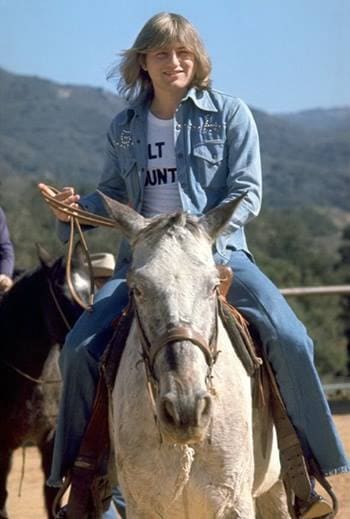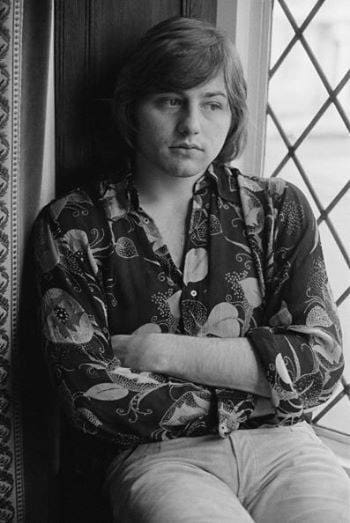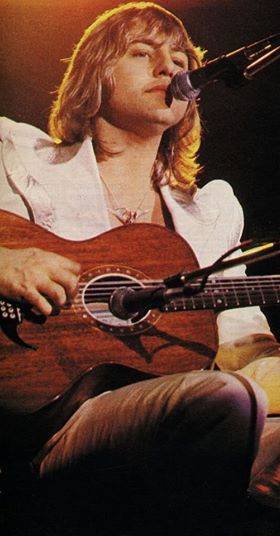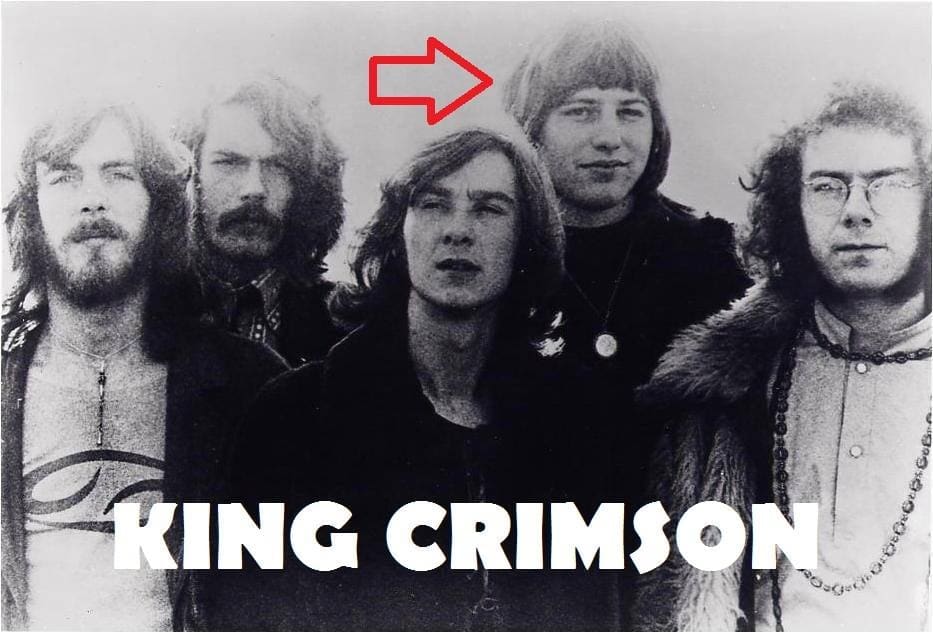DECEMBER 7, 2016 – Former King Crimson and Emerson, Lake & Palmer vocalist/bassist/songwriter GREG LAKE (b. November 10, 1948 in Poole, Dorset, England) died at age 69 after battling cancer.
His manager announced the news on Twitter, describing Lake’s battle with the illness as “long and stubborn.” Numerous fellow musicians paid tribute, including Rick Wakeman and Steve Hackett, Ringo Starr, John Wetton, and ELP drummer Carl Palmer. With Lake’s death and that of Keith Emerson earlier in 2016, Palmer is the last surviving member of the group.Lake grew up in a poverty stricken part of the seaside resort town of Bournemouth, Lake founded King Crimson with guitarist Robert Fripp in the late 1960s. The band pioneered the ambitious genre that came to be known as progressive rock. Lake got his first guitar for his 12th birthday as a gift from his mother, and began taking lessons from a local teacher named Don Strike. One of whose other students was Robert Fripp, who became close friends with Lake. Around the time he was 12 years old, Lake also wrote a folk-style song that played a major part in his future, entitled “Lucky Man.”Lake learned to read music and also to play pieces by Paganini, among other classical composers, but his aspirations lay with emulating the sound of his favorite band of the era, Cliff Richard & the Shadows, and their lead guitarist, Hank B. Marvin. Lake passed through a succession of groups.An early group was a local quartet called Unit Four, in which Lake played guitar and sang.
He and Unit Four guitarist David Genes later formed the Time Checks, and around 1967, along with another Unit Four member John Dickinson, Lake was a member of a band called the Shame, who cut a single in 1968. Lake also sang on a record by a band called the Shy Limbs. In 1968, Lake succeeded Mick Taylor as a member of an outfit called the Gods, whose other members included future Uriah Heep founders Ken Hensley (keyboards, vocals) and Lee Kerslake (drums), and it was there that his songwriting first blossomed.
He left The Gods just before they began to record in the summer of 1968 before they released their debut album after having been approached by Fripp to join the outfit that he was putting together out of a failed trio called Giles, Giles & Fripp. Lake joined the quintet (Fripp on lead guitar; Ian McDonald on keyboards, saxes, and flute; Michael Giles on drums; and Peter Sinfield as lyricist) as lead singer and bassist.Lake and Fripp went on to form King Crimson, and since both were primarily guitarists, Lake switched to playing bass. For King Crimson’s debut album “In the Court of the Crimson King” Lake also contributed as songwriter and singer, although Sinfield was the primary lyricist.
The album was originally to be produced by Tony Clarke who was then the producer for the Moody Blues. However, after the first day Clarke walked out as he had difficulty understanding what the band were trying to create. Lake assumed the role of producer, and although the album credits the whole band as producers, it was primarily Lake who engineered it.”In The Court of the Crimson King” was released in 1969 and made King Crimson far more successful than any of Fripp and Lake’s earlier projects (such as the Shy Limbs or Giles, Giles and Fripp), and became a key influence and landmark in the emerging progressive rock genre. Lake’s vocals, which ranged from serene and soothing to acerbic and distorted, were a striking element of the album.
However, Lake stayed with King Crimson for only about a year. King Crimson went on a North American tour with The Nice, who were on their farewell tour, and in April 1970, Lake left the band to form Emerson, Lake & Palmer along with Keith Emerson from The Nice on keyboards and Carl Palmer from Atomic Rooster on drums and percussion. Despite his official departure from King Crimson, Lake agreed to help with the completion of King Crimson’s second album “In the Wake of Poseidon.”After their debut album, ELP recorded a live performance of their treatment of “Pictures at an Exhibition”, which brought in elements of electric rock, jazz, blues and, notably, Lake’s acoustic ballad “The Sage.”
Lake contributed acoustic guitar, electric guitar, bass, lyrics, vocals and production work to the band. Due to management conflicts, this recording was not released until after their next studio album. Their second studio album “Tarkus” had a side-long epic on Side A, and Side B combined a series of hard rock songs, an instrumental and a couple of comic songs. It was immediately recognized as a landmark and defining album of progressive rock. As with “Pictures at an Exhibition” Lake was not heavily involved with the early composition work of “Tarkus”, although all of the lyrics and production work on both albums are his.
He did contribute a haunting electric guitar solo to the epic title track. Also, the evocative lyrics and acerbic vocals of various songs from Side B of “Tarkus” (particularly “Bitches Crystal” and “A Time and a Place”) have been acclaimed by fans.This was followed by the album “Trilogy” which Lake rates as his favorite ELP album. His ballad “From the Beginning” was their most commercially successful single. Lake continued to provide powerful lyrics and highly inventive and adroit vocals in songs such as “The Endless Enigma” and the title track. This album was the most refined of ELP’s work, combining signature classical pieces (“Hoedown” and Abaddon’s “Bolero”) with multi-part progressive tracks (such as “The Endless Enigma”) and shorter, more accessible songs (such as “Living Sin”).The trio did not make use of external producers for any of their albums in the 1970s, nor did they employ session players for studio work or live performances. During concerts, Lake would play acoustic guitar, electric guitar or bass as required. Beginning with the 1973 album “Brain Salad Surgery” Lake did collaborate with Peter Sinfield to write lyrics.
With ELP steadily becoming one of the highest-grossing live acts on earth, they released their most ambitious album yet in 1973, “Brain Salad Surgery.” Once again, Lake contributed a soulful ballad “Still… You Turn Me On” and was able to match the grandiose playing of Emerson and Palmer not only with tight guitar and bass work, but also with innovative lyrics, most notably for the apocalyptic and bizarre epic “Karn Evil 9” (the first ELP song in which Lake collaborated with Peter Sinfield to write lyrics). Lake’s production skills ensured his continued success in harnessing the complex, multi-layered and polyrhythmic studio work of the band into tightly produced, highly successful albums. Although he gave Emerson a free rein to incorporate massive, virtuosic instrumentals (such as in “Toccata” and the second impression of “Karn Evil 9”), Lake ensured that each album contained familiar, accessible material (such as his cover of Hubert Parry’s anthem “Jerusalem” based on William Blake’s preface to “Milton a Poem”). In particular, the decision to release “Karn Evil 9: First Impression, Part 2” as a single resulted in continued radio play and commercial attention being given to ELP. The driving lyrics of this section, opening with the classic line “Welcome back my friends to the show that never ends,” ensured that Lake’s vocals and ELP’s unique brand of musicality would continue to gain popular recognition.In 1973, Lake also founded the Manticore label and signed some very talented musicians such as Italy’s PFM and Banco and King Crimson/Emerson, Lake & Palmer lyricist Pete Sinfield.
The company is named after a beast pictured inside the album “Tarkus.” (The fifth movement of the “Tarkus” suite is named “Manticore” which is the mythological creature who finally succeeds in beating Tarkus.) Having produced albums, on which he also played, for both King Crimson and ELP, Lake briefly produced albums for other artists, including “Spontaneous Combustion” (1972), “Stray Dog” (1973) and “Keith Christmas” (1974).ELP’s massive commercial success continued when they were the headline act (along with Deep Purple) at 1974’s California Jam, where they played live to an audience of some 180,000. In the midst of this unprecedented renown and immense financial success, ELP went on a two-year hiatus, most likely due to growing tension among the members. During the hiatus, Lake gained further popularity for his UK Christmas #2 single, “I Believe in Father Christmas” (released in 1975). It continues to be a well-known Christmas pop song, and Lake actually traveled around the Middle East to record the haunting film clip.
The song was recorded with an orchestra and released as a solo effort.ELP then emerged from the hiatus and in 1977 they released the double album “Works Volume I” with each member having an entire side to himself. Lake’s “side” consisted of five acoustic ballads, some of which included an orchestra (and all of which had lyrics co-credited to Peter Sinfield). The mournful “C’est la Vie” and the inspirational “Closer to Believing” were particularly noteworthy, marking a mature, restrained and introspective side to his artistry. Lake was also a driving force behind the 13-minute song “Pirates” which occupied side 4 of the album along with the song that has become ELP’s greatest legacy: their overdriven, electric rendition of “Fanfare for the Common Man.” The album was highly successful, but it has been described by Lake as “an image of a band fragmenting.” ELP had successfully reinvented themselves as an orchestral band, and also turned out a timeless rock treatment of Copland’s “Fanfare” but a return to the heights they had reached a few years earlier was not to be.”I Believe in Father Christmas” was later re-recorded with Emerson and Palmer, and included on their next album, “Works Volume II”; it contains a direct reference in the melody to Sergei Prokofiev.
This album also contained a number of signature Lake ballads, such as “Show Me the Way to Go Home” and “Watching Over You” (a ballad written for his daughter). Lake was also pivotal in the creation of many other songs on the album, such as “Tiger in a Spotlight” (a minor hit) and “So Far to Fall.” The album was by far, the most radio-friendly, pop-oriented and accessible work that ELP had, thus far, ever produced, nonetheless, it was seen as a collection of leftovers, and it was their first commercial failure.Emerson spearheaded plans to embark on an orchestral tour to accompany the “Works” albums. The tour was a financial disaster that bankrupted the band and brought to the fore the growing tensions among the members, particularly between Lake and Emerson. They were obliged to make another album for their record label, and went to the Bahamas to record what became “Love Beach.” Lake was highly uninterested in the album, leaning heavily on Sinfield to write all of the lyrics, and flying home as soon as his final guitar work was recorded. Emerson was left with some technicians to finish cutting the album, so no one is actually credited or recognized as being the album’s producer. ELP’s final obligations were then fulfilled by In Concert (later rebranded as “Works Live” and expanded to double-album length), a live album garnered from the ill-fated orchestral tour, which was released after they had already broken up.ELP were hugely successful in the 1970s (with album sales totaling over thirty million), and significantly contributed to the evolution of progressive rock. ELP sold more than 30 million albums in the 1970s, and made a significant musical contribution to the evolution of progressive rock. Lake co-wrote many of ELP’s songs but was known for his guitar-oriented, soulful ballads. Lake’s focus on ballads, radio-friendly material and “down-to-earth” compositions contrasted sharply with Emerson’s desire to create rock symphonies and polyphonic, poly-rhythmic suites. Their collaboration led to ELP creating albums with an eclectic mixture of classical pieces, ballads, hard rock songs and epic-length suites. In 1973, Lake founded Manticore Records and signed several very talented musicians such as Italy’s PFM and Banco, and King Crimson / Emerson, Lake & Palmer lyricist Peter Sinfield.After the break-up of ELP, Lake toured briefly with the group Asia in 1983 as a temporary replacement for John Wetton, as well as releasing two well received solo albums and conducting a tour in the early 1980s. The albums were “Greg Lake” (1981) and “Manoeuvres” (1983), both of which featured ex-Thin Lizzy guitarist Gary Moore and, even though the latter is more sophisticated, saw Lake playing straight rock. The first also featured an unfinished Bob Dylan track, obtained through a mutual friend and completed by Lake.In 1986 Lake, Emerson and drummer Cozy Powell released the album “Emerson, Lake and Powell”, basically an ELP reunion with Powell replacing Palmer who was then drumming (and contractually obligated) with the band Asia. The “new” ELP toured, and then Palmer replaced Powell, before the line-up split once more.Lake’s only other foray into production appears to be “The King’s Singers” (1987) & (2005) and Jim Davidson’s “Watching Over You”, the title track being and ELP song.Having worked with Geoff Downes in Asia, Lake and Downes recorded 6 tracks in summer 1988 as “Greg Lake’s Ride the Tiger.” A new Asia line-up for Downes curtailed the project, but ELP used one song (“Affairs of the Heart”) on their next album “Black Moon” and Asia used another (“Love Under Fire”) on their next album “Aqua.”Emerson, Lake & Palmer subsequently reunited in the early 1990s and played the progressive rock circuit, especially in outdoor summer concerts, and released two new studio albums. In 1998, the members of ELP had a rather acrimonious falling-out and Lake left the band.Keith Emerson’s 2004 memoirs “Pictures of an Exhibitionist” give an unflattering portrait of Lake, and not surprisingly Lake has said that he would never reunite with ELP in the future. He was not especially visible on the music scene since then, although he did tour as a member of Ringo Starr’s All-Starr Band in 2001. In late 2003 he played bass on The Who’s “Real Good Looking Boy.”On October 22, 2005 Lake began touring the UK with a brand new “Greg Lake Band” to positive reviews. The band comprises David Arch on keyboards, Florian Opahle on guitar, Trevor Barry on bass, and Brett Morgan on drums. A double DVD was released by Warner Bros/Classic Pictures early 2006, with Greg Lake in full form, his voice now deeper and louder than before. The Greg Lake Band was ready for a new tour on September 2006 with rumors of a new album in the pipeline, although this tour was canceled at the last minute due to “management troubles.”After more than a decade, Emerson, Lake & Palmer reunited in the Summer of 2010 at the High Voltage Festival. As preparation for this show, Keith Emerson and Greg Lake toured North America in the Spring of 2010, presenting an intimate unplugged performance of King Crimson, ELP and The Nice selections featuring only Emerson and Lake performing.
SOURCES
http://www.greglake.com/http://www.ladiesofthelake.com/
http://www.emersonlakepalmer.com/
https://www.allmusic.com/…/greg-lake…/biography
https://www.allmusic.com/artist/king-crimson-mn0000076057/biography
https://www.allmusic.com/artist/emerson-lake-palmer-mn0000798992/biography
http://www.mtv.com/artists/greg-lake/biography/
http://yes.wikia.com/wiki/Greg_Lakehttp://www.brain-salad.com/http://www.progarchives.com/artist.asp?id=94
http://www.rollingstone.com/…/prog-rock-pioneer-greg…
http://en.wikipedia.org/wiki/Greg_Lakehttp://en.wikipedia.org/wiki/King_Crimson
http://en.wikipedia.org/wiki/Emerson,_Lake_%26_Palmerhttps://www.facebook.com/GregLakeFanPage
https://www.facebook.com/pages/King-Crimson/14038332518
https://www.facebook.com/EmersonLakePalmer
https://www.facebook.com/pages/Greg-Lake/118368008204116




